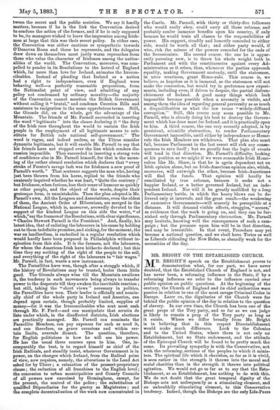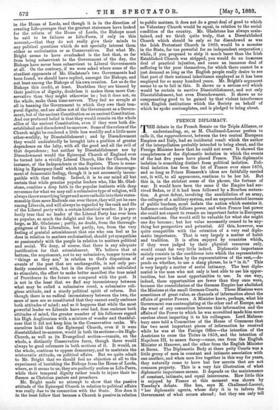MR. BRIGHT ON THE ESTABLISHED CHURCH.
MR. BRIGHT'S speech on the Establishment proves to demonstration what, for our part, we have never doubted, that the Established Church of England is not, and has never been, a reforming influence in the State, if by a reforming influence we refer to the influence exerted over public opinion on public questions. At the beginning of the century, the Church of England and its chief authorities were passive in relation to one of the most savage Criminal Codes in Europe. Later on, the dignitaries of the Church were far behind the public opinion of the day in relation to the question of slavery. In our own time, the Church has been one of the great props of the Tory party, and so far as we can judge is likely to remain a prop of the Tory party as long as it exists. Where we differ broadly from Mr. Bright is in believing that in this respect Disestablishment would make much difference. Look to the Colonies and to the United States, where there is not only no Establishment, but no State endowment, and the attitude of the Episcopal Church will be found to be pretty much the same. Its prevailing sympathy is with the Conservative, not with the reforming, sections of the peoples to which it minis- ters. The spiritual life which it cherishes, so far as it is vivid, is seen rather in the strength it throws into the moral and social charities than in the strength it throws into political agitation. We would not go so far as to say that the Esta- blishment, as an Establishment, has nothing to do with this. We do not doubt that the great temporal dignity of the Bishops acts not unfrequently as a stimulating element, and an unhealthily stimulating element, to this Conservative tendency. Indeed, though the Bishops are the only Life-Peers
in the House of Lords, and though it is in the direction of creating Life-peerages that the greatest statesmen have looked for the reform of the House of Lords, the Bishops must be said to be failures as Life-Peers, if only on this account,—that they do not really give their minds to any political questions which do not specially interest them either as ecclesiastics or as Conservatives. But what Mr. Bright seems to have overlooked is the fact that, so far from being subservient to the Government of the day, the Bishops have never been subservient to Liberal Governments at all. On the contrary, if we were asked where some of the sturdiest opponents of Mr. Gladstone's two Governments had been found, we should have replied, amongst the Bishops, and not least among the Bishops of his own creation. Let us do the Bishops this credit, at least. Doubtless they are biassed by their position of dignity, doubtless it makes them more Con- servative than they might otherwise be ; but it does not, on the whole, make them time-servers. They feel no scruple at all in banning the Government to which they owe their tem- poral dignity, and are allies not of the Government as a Govern- ment, but of the ancient Constitution as an ancient Constitution.
And our profound belief is that they would remain on the whole allies of the ancient Constitution, even if they were both dis- established and disendowed to-morrow. Some of the rulers of the Church might be rendered a little less worldly and a little more other-worldly, by Disestablishment ; and by Disendowment they would undoubtedly be brought into a position of greater dependence on the laity, with all the good and all the evil of that dependence ; but neither by Disestablishment nor by Disendowment would the Episcopal Church of England ever be turned into a vividly Liberal Church, like the Church, for instance, of the Independents or the Baptists. There is some- thing in Episcopacy itself which tends towards the discourage- ment of democratic feeling, though it is not necessarily incom- patible with that feeling. Indeed, it is to our mind all but certain that while genuine popular leaders who, like Mr. Glad- stone, combine a deep faith in the popular instincts with deep reverence for what we may call a submissive type of religion, will always throw something larger and more catholic into their states- manship than mere Radicals can ever throw, they will yet be rare among Liberals, and will always be regarded by the rank and file of the Liberal party with a certain historical wonder. It is per- fectly true that no leader of the Liberal Party has ever been so popular, so much the delight and the hero of the party at large, as Mr. Gladstone ; partly, no doubt, from the thorough- goingness of his Liberalism, but partly, too, from the very feeling of grateful astonishment that one who can feel as he .does in relation to matters ecclesiastical, should yet sympathise so passionately with the people in relation to matters political and social. We deny, of course, that there is any adequate justification for that astonishment. We believe that at bottom, the acquiescent, not to say submissive, temper towards "things as they are," in relation to God's disposition of events of the past that are unchangeable, is not only per- fectly consistent with, but in the deepest minds calculated to stimulate, the effort to make better manifest the true mind of Providence in the future as compared with the past. It is not in the least that we find any inconsistency between what may be called a submissive creed, a submissive reli- gious attitude, and a sturdy political spirit of reform. But though there is no radical inconsistency between the two, the mass of men are so constituted that they cannot easily embrace both attitudes of mind; and so it happens that while the most powerful leader we Liberals have ever had, does embrace both attitudes of mind, the greater number of his followers regard his High Anglicanism with a mixture of wonder and thankful- ness that it did not keep him in the Conservative ranks. We ourselves hold that the Episcopal Church, even if it were disestablished to-morrow, would in both its sections—its High- Church, as well as its Evangelical section—remain, on the whole, a distinctly Conservative force, though there would always be good reformers in both sections of it. It would, on the whole, continue to oppose democracy, and to maintain the aristocratic attitude, on political affairs. But we quite admit to Mr. Bright that we should feel no objection at all to the experiment of banishing the Bishops from the House of Lords, where, as it seems to us, they are perfectly useless as Life-Peers, while their temporal dignity rather tends to injure their in- fluence as Christian pastors and preachers. Mr. Bright made no attempt to show that the passive attitude of the Episcopal Church in relation to political affairs was really due to its connection with the State. Nor does it in the least follow that because a Church is passive in relation to public matters, it does not do a great deal of good to which no Voluntary Church would be equal, in relation to the social condition of the country. Mr. Gladstone has always main- tained, and we think quite truly, that a Disestablished Church which should be only so far disendowed as was the Irish Protestant Church in 1869, would be a monster in the State, far too powerful for an independent corporation ; while, if you proposed to strip it much barer than the Irish Established Church was stripped, you would do an immense deal of practical injustice, and cause an immense deal of suffering to the poor themselves, for which there cannot be a just demand so long as the English people really desire to see that part of their national inheritance employed as it has been employed for so many hundred years. Mr. Bright's argument seems to us to fail in this. It shows us a serious evil which would be certain to survive Disestablishment, and not only Disestablishment, but even Disendowment. It shows us no compensating good to be gained by that violent interference with English institutions which the Society on behalf of which he spoke contemplates, and is pledged to bring about.



































 Previous page
Previous page